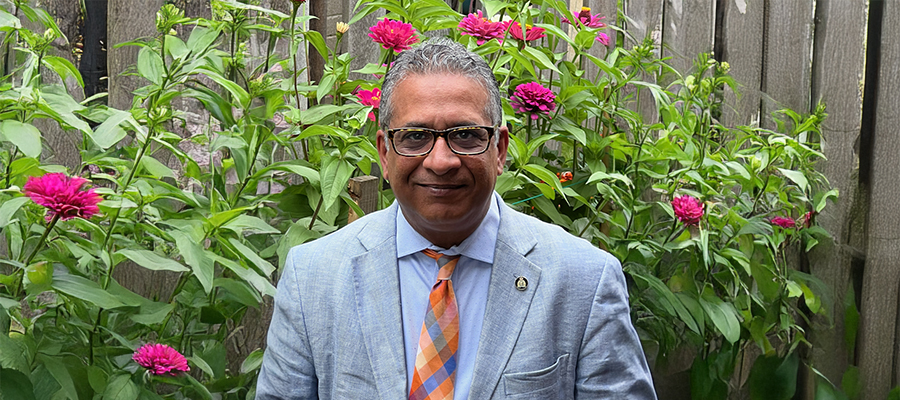

When Susheel Gupta entered the legal profession at the turn of the 21st Century, he quickly developed an interest in the emerging area of tech crime.
As a junior lawyer with the Public Prosecution Service of Canada (PPSC) in Ottawa, Susheel was part of a small group of counsel assigned to prosecutions and investigations involving digital evidence.
“Around that time, we were just beginning to see a noticeable increase in the volume of cases involving electronic evidence,” he says.
More than two decades later, Susheel’s area of expertise is no longer so niche, thanks to the rapid pace of technological development over the same period.
“These days, you’d be hard-pressed to find a case that didn’t involve some kind of electronic evidence,” he says.
With smart phones and social media now embedded in most of our lives, new and difficult privacy and legal issues are emerging all the time. Co-program chair Susheel and various other speakers will be exploring some of them at Osgoode’s 18th National Symposium on Tech Crime and Electronic Evidence.
“It’s an area that anyone practising criminal or regulatory law needs to have an awareness and understanding of,” he says.
Susheel, who works as the RCMP’s Senior Strategic Operations Director for Counter-Terrorism & National Security, has a deep and personal connection to the criminal justice field. In the summer of 1985, when Susheel was 12 years old, his mother was one of 329 people killed in the Air India bombing.
It took 15 years for charges to be laid in the subsequent criminal investigation, before a trial resulted in the acquittal of the two accused in 2005. The families of the victims then endured a further, years-long wait for a public inquiry to finally deliver its findings on the failures that precipitated the atrocity in 2010.
“I certainly learned a lot about criminal justice during that time and it kind of shaped the direction that I wanted to go in making a contribution to the system and helping crime victims,” Susheel says.
Alongside his professional roles at the DOJ, PPSC, the RCMP, and the Canadian Human Rights Tribunal – where he had spent eight years as Vice Chairperson and acting CEO – Susheel has kept up his advocacy for victims’ rights. That includes volunteer roles as Board Chair of the Canadian Resource Centre for Victims of Crime and as a Member of International Network Supporting Victims of Terrorism and Mass Violence.
At Osgoode, Susheel has been involved in the tech crime and electronic evidence symposium almost since its inception. As a speaker and now as co-chair, he has been well placed to witness the expansion of its target audience.
“When the program started, it was mainly investigators, as well as some Crown and defence lawyers, because they were the people dealing with these issues,” Susheel says. “More recently, there’s been a transition and we’re seeing a much broader collection of people who are confronted with electronic evidence in their work, including investigators, computer forensic specialists, defence lawyers, prosecutors and regulatory lawyers.”
“It’s actually a really good mix,” he adds.
Susheel says he and his fellow co-chairs embrace Osgoode’s reputation for applied learning when recruiting faculty for the annual symposium, approaching professionals with a wide range of hands-on experience in the field of tech crime and electronic evidence.
“We’re always trying to bring in fresh minds every year – practitioners who are actually dealing with these types of cases, so that folks can hear from some of the best people who are thinking about these issues and working through them every day in real life,” he says.
According to Susheel, the annual update on search and seizure challenges as they relate to electronic evidence is a highlight for many returning attendees at the symposium.
“It has become very much a mainstay of the program because the area has so many updates. There are lots of laws being made and decisions being pronounced upon by courts,” he explains.
The program also caters to newcomers looking to build the foundations of a professional practice in tech crime and electronic evidence, Susheel adds, highlighting a session on the introduction and authentication of digital evidence in court.
For legal practitioners who want to delve further into the issues raised at the tech crime and electronic evidence symposium, there are plenty of options at Osgoode. For example, the Osgoode Certificate in Privacy and Cybersecurity Law counts Susheel among its past recipients. Meanwhile, Osgoode’s extensive part-time professional LLM offering includes specializations in Criminal Law and Procedure or Privacy and Cybersecurity Law.
Want to learn more about the 18th National Symposium on Tech Crime and Electronic Evidence?

Susheel Gupta – Senior Strategic Operations Advisor – Counter‑Terrorism & National Security, Royal Canadian Mounted Police
Program Co-Chair of the 18th National Symposium on Tech Crime and Electronic Evidence

